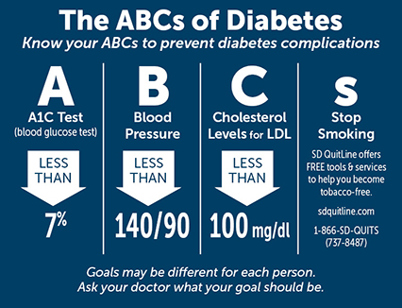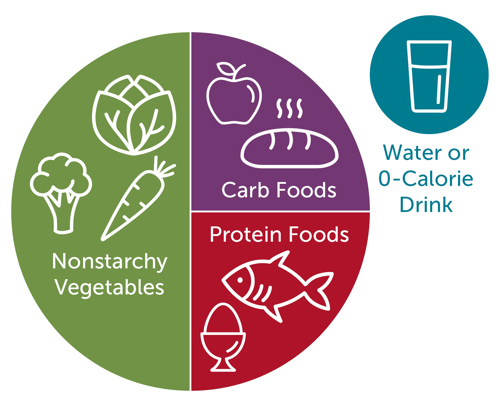
Diabetes can affect almost every part of your body. Therefore, learning about your diabetes and care takes time. Try to work a little each day to improve your care for your diabetes, and don’t be afraid to ask for help and support from your diabetes care team. Knowing your ABCs will also help you manage your blood glucose, blood pressure, and cholesterol. Stopping smoking will also help you manage your diabetes. Working toward your ABC goals can help lower your chances of heart attack, stroke, or other diabetes problems.
A is for the A1C test
The A1C test shows your average blood glucose level over the past 3 months. The A1C goal for many people with diabetes is below 7 percent. Ask your healthcare team what your goal should be.
B is for Blood Pressure
The blood pressure goal for most people with diabetes is below 140-90 mm Hg. Ask what your goal should be.
Get More information on High Blood Pressure
C is for Cholesterol
You have two kinds of cholesterol in your blood: LDL and HDL. LDL or "Bad" cholesterol can build up and clog your blood vessels. Too much bad cholesterol can cause a heart attack or stroke. HDL or "good" cholesterol helps remove the "bad" cholesterol from your blood vessels. Ask your healthcare team what your cholesterol numbers should be.
Get More Information on Cholesterol
S is for Stop Smoking
People with diabetes who smoke are more likely than nonsmokers to have trouble with insulin dosing and controlling their disease.1 The more cigarettes you smoke, the higher your risk for type 2 diabetes.1 No matter what type of diabetes you have, smoking makes your diabetes harder to control. If you have diabetes and you smoke, you are more likely to have serious health problems from diabetes. Smokers with diabetes have higher risks of severe complications, including:2
- Heart and kidney disease
- Poor blood flow in the legs and feet can lead to infections, ulcers, and possible amputation (removal of a body part by surgery, such as toes or feet)
- Retinopathy (an eye disease that can cause blindness)
- Peripheral neuropathy (damaged nerves in the arms and legs that cause numbness, pain, weakness, and poor coordination)
If you are a smoker with diabetes, quitting smoking will benefit your health right away. People with diabetes who quit have better control of their blood sugar levels.3 For free help to quit, call 1-866-SD Quits or visit www.sdquitline.com.
-
U.S. Department of Health and Human Services. The Health Consequences of Smoking - 50 Years of Progress: A Report of the Surgeon General. Atlanta: U.S. Department of Health and Human Services, Centers for Disease Control and Prevention, National Center for Chronic Disease Prevention and Health Promotion, Office on Smoking and Health, 2014 [accessed 2018 Mar 22].
-
U.S. Department of Health and Human Services. A Report of the Surgeon General. How Tobacco Smoke Causes Disease: What It Means to You. Atlanta: U.S. Department of Health and Human Services, Centers for Disease Control and Prevention, National Center for Chronic Disease Prevention and Health Promotion, Office on Smoking and Health, 2010 [accessed 2018 Mar 22].
-
U.S. Department of Health and Human Services. How Tobacco Smoke Causes Disease: The Biology and Behavioral Basis for Smoking-Attributable Disease. A Report of the Surgeon General. Atlanta: U.S. Department of Health and Human Services, Centers for Disease Control and Prevention, National Center for Chronic Disease Prevention and Health Promotion, Office on Smoking and Health, 2010 [accessed 2018 Mar 22].
Controlling diabetes means keeping blood sugar levels and blood pressure levels near normal – every day over a lifetime. This is no easy task.
Diabetes is complicated, yet most people with type 2 diabetes – the most common form of the disease – have not gotten the training they need to manage it well in their everyday life. There isn't a cure yet for diabetes, but healthy lifestyle habits, taking medicine as needed, getting diabetes self-management education, and working with your health care team can greatly reduce diabetes’ impact on your life.
Learn about Living with Diabetes
Talking with Your Doctor
Being prepared with your questions and goals in mind will help you and your care team or doctor make treatment decisions and a diabetes care plan that works for you.
Find Resources to Help Prepare for a Doctor's Visit:
NIDDK | Getting Ready for Your Diabetes Care Visit – You are the person in charge of your diabetes. Being prepared for your healthcare visit can help you get the information you need to manage your disease.
Your Health Care Team – Information on the members of your diabetes care team and what they do, from the American Diabetes Association.
Know Your Care – Learn more about how diabetes impacts your body and the importance of receiving routine diabetes care.
Healthy Eating for Diabetes Management
Managing blood sugar is essential for living well with diabetes, and healthy eating plays a vital role in achieving this balance. By choosing nutritious foods, eating the right portions, and timing your meals, you can help keep your blood sugar within your target range. Partner with your dietitian or diabetes educator to develop a personalized eating plan, and explore these resources from the CDC to learn more about making healthy choices.
Find Healthy Eating Tips Find Tips for Eating Healthy During the Holidays
The Plate Method
Start with a 9-inch dinner plate:
- Fill half with nonstarchy vegetables
- Fill one quarter with lean protein
- Fill one quarter with carb foods
Then choose water or a low-calorie drink.
Controlling diabetes means keeping blood sugar levels and blood pressure
For those who have diabetes, Diabetes Self-Management Education (DSME) is a key step in improving health and quality of life. DSME focuses on healthy eating, physical activity, and monitoring blood sugar. It is a "teamwork" approach between the diabetes educators and the person with diabetes. The program will help participants gain the knowledge, problem-solving, and coping skills needed to successfully self-manage diabetes and its related conditions. DSME prevents complications and hospitalizations. Ask your primary care doctor for a referral to a DSMES program or to meet with a Certified Diabetes Care and Education Specialist. DSMES is covered by Medicare, Medicaid, and most insurance plans (copays and deductibles may apply - contact your insurance company for details).
Locate a Diabetes Self-Management Program Near You
If you are interested in starting a Diabetes Self-Management Education program at your facility or would like information on how to get your program recognized or accredited for reimbursement, call 605-773-2981.
DSMES Reimbursement with Medicaid
In accordance with Administrative Rule of South Dakota 67:16:46:02 diabetes education programs must be recognized by the American Diabetes Association or the South Dakota Department of Health in order to enroll as a Medicaid provider. Programs recognized by the South Dakota Department of Health Include: Association of Diabetes Care & Education Specialists (ADCES)
*Additionally, diabetes self-management education is a Federally Qualified Health Center (FQHC) and Rural Health Clinic (RHC) service. Please contact the South Dakota Department of Social Services for further questions regarding reimbursement for FQHC and RHC or for more information on enrolling as a Medicaid provider.
In South Dakota, most health insurance plans, Medicaid and Medicare will cover your prescription medications, diabetes supplies and equipment, and diabetes self-management education. Some people may have copays or deductibles.
Understanding your diabetes care and coverage can help you feel your best and live a healthy life with diabetes. Your primary care provider will work with you and other experts to create or revise your care plan. Your insurance company can inform you of essential and covered services to best manage your diabetes care plan, to contact your insurance provider call the number on your insurance card.
Downloadable Resources:
- Know Your Plan: It is important to understand your insurance coverage for your diabetes care, including office visits, screenings, laboratory tests, and pharmacy coverage
- Phone Script: This sample script will assist you in calling your insurance company to better understand your diabetes-related coverage and out-of-pocket costs.
The cost of diabetes prescription medications and insulin has risen sharply in recent years. If you are finding it hard to pay for your medications or insulin, talk to your doctor. Never cut back or stop taking your medication. There may be less expensive options, and there are now many discount programs.
- South Dakota Rx Card is a free prescription assistance program available to everyone living in South Dakota. The program was launched to help the uninsured and underinsured residents of South Dakota gain access to significant savings on prescription medications at their local pharmacies.
- Good RX website/app to compare prices and get coupons on medications can be used even if you have insurance.
- The American Diabetes Association Prescription Assistance Program has helpful information on prescription medications and managing diabetes costs.
- Insulin Pharma Company’s assistance Programs: Humalog, from Eli Lily, has the Lilly Cares program which helps offset the costs of Humalog for lower-income patients who qualify. You can review the qualifications and sign up for Lilly Cares on their website.
- There is also the American Diabetes Association site where there is a detailed list of drug companies and other prescription assistance programs: www.insulinhelp.org
- ADCES’ Insulin Cost Resource Guide
- The Affordable Insulin Project also maintains a list of patient assistance programs.
- ReliOn Insulin is available at Walmart Pharmacies and is a lower-cost insulin compared to brand-name insulins. The Diabetes Council has put together a detailed overview of everything you need to know about ReliOn insulin. (ReliOn line also includes low-priced blood glucose testing meters, test strips, and insulin syringes.)
- NovoCare® provides resources to help you understand your options, find costs, and connect you to affordability support. To learn more and get help with cost: https://www.novocare.com/
Caregivers are family members and friends who provide help and support to a person with diabetes. Too often, caregivers are not given the information, education, and tools they need to provide the right support.
Tips for Caregivers – Information from the American Diabetes Association
How to Help a Loved One Cope with Diabetes – A helpful tip sheet from the Centers for Disease Control & Prevention (CDC)
It’s hard to manage diabetes on your own. Support can come from family members, friends, support groups, and even online communities who care about you. Tap into their support for encouragement, understanding, and assistance.
South Dakota’s Better Choices Better Health offers chronic disease self-management education workshops that are designed to help adults living with ongoing physical and/or mental health conditions and caregivers understand how healthier choices can improve quality of life, boost self-confidence, and inspire positive lifestyle changes.
The program consists of 4 different self-management workshops: chronic disease, diabetes, chronic pain, and worksite chronic disease. Workshop participants will find a supportive community to help them get through their daily activities and manage physical and mental health wellness. When they have the support and tools to make healthier choices, they can improve their health and lead fuller lives.

